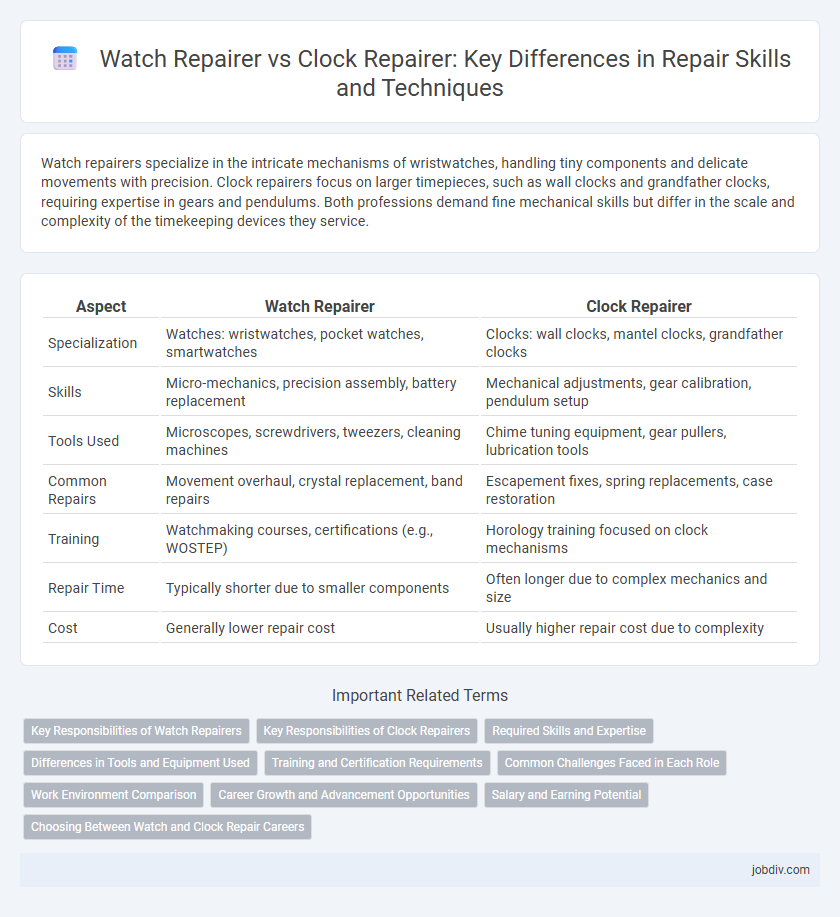Watch repairers specialize in the intricate mechanisms of wristwatches, handling tiny components and delicate movements with precision. Clock repairers focus on larger timepieces, such as wall clocks and grandfather clocks, requiring expertise in gears and pendulums. Both professions demand fine mechanical skills but differ in the scale and complexity of the timekeeping devices they service.
Table of Comparison
| Aspect | Watch Repairer | Clock Repairer |
|---|---|---|
| Specialization | Watches: wristwatches, pocket watches, smartwatches | Clocks: wall clocks, mantel clocks, grandfather clocks |
| Skills | Micro-mechanics, precision assembly, battery replacement | Mechanical adjustments, gear calibration, pendulum setup |
| Tools Used | Microscopes, screwdrivers, tweezers, cleaning machines | Chime tuning equipment, gear pullers, lubrication tools |
| Common Repairs | Movement overhaul, crystal replacement, band repairs | Escapement fixes, spring replacements, case restoration |
| Training | Watchmaking courses, certifications (e.g., WOSTEP) | Horology training focused on clock mechanisms |
| Repair Time | Typically shorter due to smaller components | Often longer due to complex mechanics and size |
| Cost | Generally lower repair cost | Usually higher repair cost due to complexity |
Key Responsibilities of Watch Repairers
Watch repairers specialize in diagnosing and fixing intricate mechanical and electronic issues in wristwatches, including repairing movements, replacing batteries, and adjusting timekeeping accuracy. Their expertise extends to working with miniature components such as gears, springs, and jewels, requiring precision tools and steady hands. Unlike clock repairers who often handle larger timepieces, watch repairers focus on compact devices demanding detailed craftsmanship and fine adjustments.
Key Responsibilities of Clock Repairers
Clock repairers specialize in diagnosing mechanical malfunctions, calibrating intricate gear systems, and restoring antique timepieces with precision. They meticulously disassemble clocks, clean components, replace worn-out parts, and ensure accurate timekeeping by adjusting pendulums or electronic mechanisms. Their expertise extends to repairing various clock types, including grandfathers, wall clocks, and modern quartz models, emphasizing durability and aesthetic preservation.
Required Skills and Expertise
Watch repairers require precision skills in handling miniature components, expertise in micro-mechanics, and proficiency with magnification tools to address intricate watch movements. Clock repairers need strong knowledge of larger mechanical systems, experience in restoring antique clock mechanisms, and ability to work with diverse materials such as wood and metal casings. Both professionals must possess problem-solving abilities and a thorough understanding of timekeeping technology, but watch repairers emphasize fine detail work while clock repairers focus on structural and mechanical restoration.
Differences in Tools and Equipment Used
Watch repairers primarily use precision tools such as tiny screwdrivers, tweezers, and magnification devices designed for intricate, small-scale components. Clock repairers, on the other hand, rely on larger tools like winding keys, gear pullers, and specialized lubricants to maintain and fix bigger mechanical systems. The scale and complexity of clocks require heavier-duty equipment compared to the delicate instruments essential for watch repairs.
Training and Certification Requirements
Watch repairers typically require specialized training in micro-mechanics and fine motor skills, often obtained through watchmaking schools or apprenticeships certified by organizations like the American Watchmakers-Clockmakers Institute (AWCI). Clock repairers focus on larger mechanisms and may receive certification from institutions such as the National Association of Watch and Clock Collectors (NAWCC), emphasizing knowledge of mechanical clock movements and restoration techniques. Both professions demand precision and expertise, but watch repairers tend to pursue more intensive training for handling intricate components, while clock repairers specialize in the maintenance of timekeeping devices with larger parts and varying mechanical systems.
Common Challenges Faced in Each Role
Watch repairers often encounter challenges related to the intricate and miniature components requiring precision tools and steady hands, whereas clock repairers deal with larger, more complex mechanical systems that demand specialized knowledge of gears and pendulums. Both roles face difficulties sourcing rare or antique parts, complicating restoration efforts and extending repair times. Maintaining accuracy and functionality while preserving the aesthetic and historical value remains a core challenge in watch and clock repair alike.
Work Environment Comparison
Watch repairers often work in small, well-lit workshops or retail settings where precision tools and magnification equipment are essential for handling tiny components. Clock repairers typically operate in larger workshop spaces that accommodate a variety of clock sizes and mechanical parts, often requiring benches or platforms designed for heavier devices. Both professions demand high attention to detail, but the work environment differs due to the scale and intricacy of the timepieces they service.
Career Growth and Advancement Opportunities
Watch repairers typically experience faster career growth due to the high demand for precision skills in luxury and smartwatches, opening pathways to specialized certifications and brand partnerships. Clock repairers often find advancement through mastering antique and complex mechanical systems, enabling roles in museum restoration or high-end custom clockmakers. Both careers benefit from continuous skill development, but watch repair offers broader opportunities in retail and tech integration sectors.
Salary and Earning Potential
Watch repairers typically earn an average salary ranging from $30,000 to $50,000 annually, with specialized skills in luxury and vintage watch maintenance increasing earning potential. Clock repairers often see salaries between $25,000 and $45,000, but those skilled in antique or large mechanical clocks can command higher rates. Both professions offer opportunities for additional income through freelance or restoration work, with watch repairers generally benefitting from higher market demand and more frequent service needs.
Choosing Between Watch and Clock Repair Careers
Choosing between a watch repairer and clock repairer career depends on specialization and market demand. Watch repairers focus on intricate mechanisms and portable timepieces, often requiring skills in micro-engineering and precision tools. Clock repairers handle larger, more complex devices such as grandfather and wall clocks, demanding expertise in mechanical and electrical components along with restoration techniques.
Watch Repairer vs Clock Repairer Infographic

 jobdiv.com
jobdiv.com